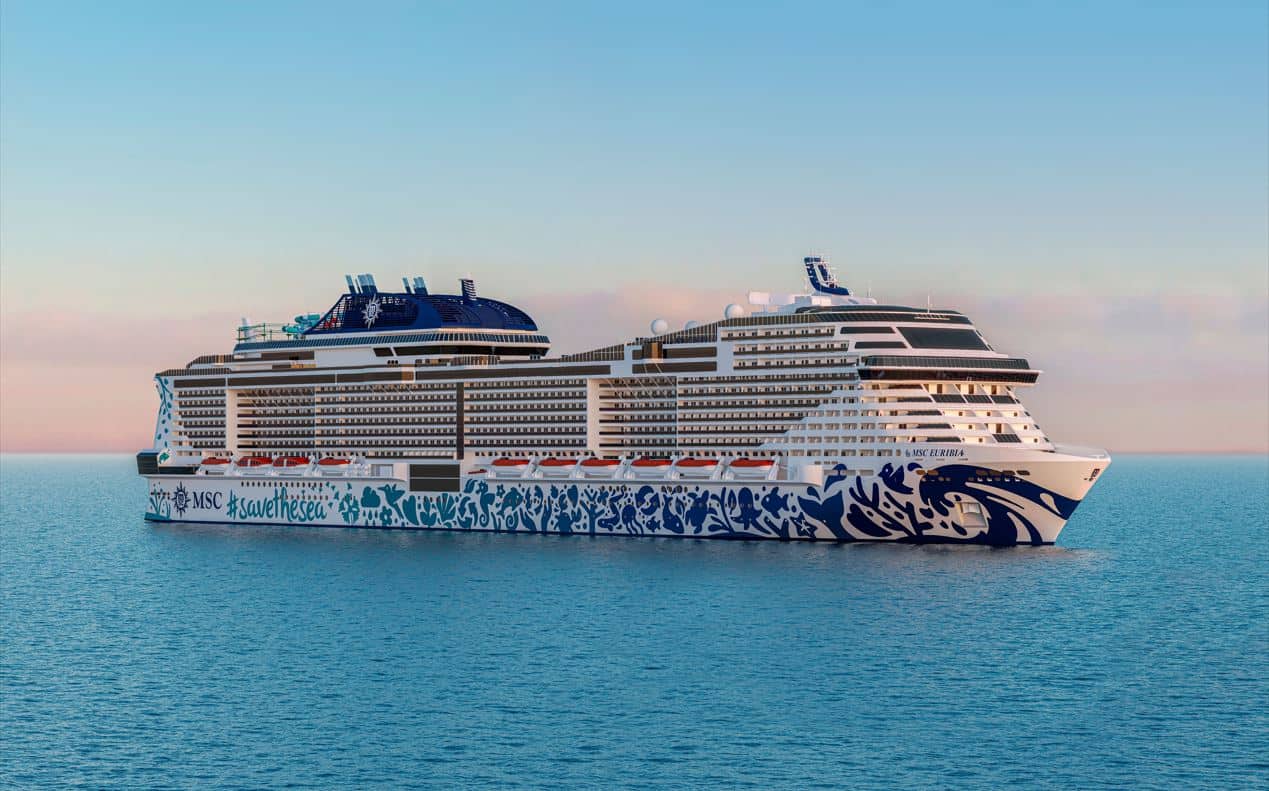
25/05/2023
THE CRUISE DIVISION OF MSC GROUP’S NEW FLAGSHIP – MSC EURIBIA – TO SAIL WORLD-FIRST NET ZERO GREENHOUSE GAS EMISSIONS CRUISE
MSC Cruises will operate the industry’s first net zero greenhouse gas emissions voyage when the liquefied natural gas (LNG)-powered MSC Euribia, leaves her shipyard in Saint-Nazaire, France on the way to her naming ceremony in Copenhagen, Denmark.
Geneva, Switzerland, 25 May 2023 – The Cruise Division of MSC Group next week will operate the industry’s first net zero greenhouse gas emissions voyage when its latest MSC Cruises flagship, the liquefied natural gas (LNG)-powered MSC Euribia, leaves her shipyard in Saint-Nazaire, France – where she is currently being built – on the way to her naming ceremony in Copenhagen, Denmark.
The new ship, the 22nd vessel to join MSC Cruises’ fleet, will sail for four days from Saint-Nazaire to Copenhagen and achieve net zero greenhouse gas emissions to demonstrate that net zero cruising is possible today. MSC Euribia will depart the French port on 3 June and is scheduled to arrive in the Danish city on 7 June.
Pierfrancesco Vago, Executive Chairman of the Cruise Division of MSC Group, said: “This industry-first net zero gas emissions voyage of our latest flagship MSC Euribia heralds another significant step on our decarbonisation journey and demonstrates more than anything the extent of our commitment.”
MSC Cruises purchased 400 tonnes of bio-LNG to show its commitment to the deployment of drop-in renewable fuels and energy transition measures towards the pioneering net zero gas emissions voyage. The line is the industry’s first deep sea ocean cruise operator to buy bio-LNG as a fuel source that has significant lifecycle emissions reductions.
Mr Vago continued: “We cannot do this alone, however. Given the absolute importance of alternative fuels for our industry as well as for other sectors across civil society to achieve decarbonization, we all need to work together to increase their availability at scale. Our purchase of bio-LNG will send a clear and meaningful signal to the market that there is demand from cruise lines and the broader maritime industry for cleaner fuels, but we need governments, producers and end-users to collaborate and scale-up the availability of these much-needed and new sources of power.”
The net zero sailing will utilise bio-LNG using a mass-balance system, the most environmentally efficient method of delivering the benefits of renewable biogas. The entire supply chain will be fully compliant with the European Union’s Renewable Energy Directive, commonly known as RED II, and each individual batch of the total bio-LNG produced has been certified by the International Sustainability & Carbon Certification.
Michele Francioni, SVP, MSC Cruises, added, “MSC Euribia’s first voyage will be an incredible feat and represents years of commitment and determination. It should prove that we have the capability to operate on a net zero greenhouse gas emissions basis with existing ship technology.
“This is just the beginning. We are committed to this transition and putting in place everything we can do to facilitate it. It cannot be done without alternative fuels such as bio-LNG, e-LNG, green hydrogen or green methanol being made widely available at scale to fully realise the vision of net zero cruising.”
MSC Cruises is being supported by Nordic energy company Gasum for the net zero greenhouse gas emissions voyage, a leading producer of biogas and processor of biodegradable waste fractions in the Nordic region.
The speed and itinerary of MSC Euribia’s maiden voyage has been designed specifically to optimise the configuration and loads of the engines to minimise fuel consumption. Dedicated energy efficiency specialists from both MSC Cruises and the ship’s constructor Chantiers de L’Atlantique will be on board the net zero sailing to monitor and optimise every aspect of this journey. They will work with the Master of the Vessel Captain Stefano Battinelli and MSC Euribia’s Chief Engineer, Pasquale Mastellone.
MSC Cruises’ shore-based energy efficiency experts based in London will continuously monitor and optimise all systems on board to minimise energy demand, identify additional opportunities to improve energy efficiency in real-time, while maintaining high comfort for all guests on board.
This will include a range of measures from the configuration of the engines down to the speed of individual air-conditioning fans in guest cabins, together with the itinerary and speed optimisation.
All of the combined initiatives will save energy to reduce fuel consumption.
MSC Cruises’ newbuilds are fuel flexible ships that can accommodate a variety of renewable fuels both available today and expected in the future. The use of fossil LNG already achieves up to a 20 per cent reduction in greenhouse gas emissions when compared to conventional marine fuels, and virtually eliminates all sulphur oxide and particulate emissions while also reducing nitrogen oxides by 85 per cent.
See all news >>>

